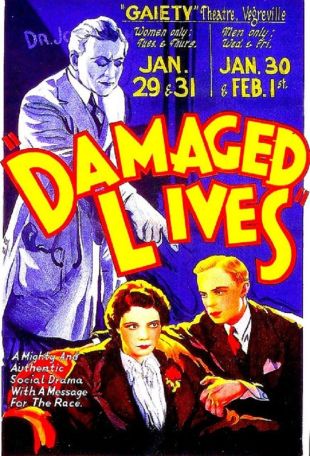
Often censored and staggeringly successful, this roadshow exploitation hit was one of the few made by a mainstream director. It was the American debut of cult filmmaker Edgar G. Ulmer, who followed it with his dark, classic version of The Black Cat for Universal. Needless to say, this is a rung or two down the ladder, being a sensationalistic exposé of the dangers of venereal disease, one of several popular "adults only" sex hygiene films touring the road show circuit at the time. No one ever says the words "venereal disease," but when young Donald (Lyman Williams) gets together with pretty socialite Elise (Charlotte Merriam) after-hours at a New York speakeasy, it's pretty obvious what he's going to bring home to his new bride Joan (Diane Sinclair). As in all of these cautionary tales, things go downhill fairly quickly after that. Donald visits a sanitorium and sees cripples and blind people covered with lesions, Elise shoots herself, and Joan tries to kill both herself and her infected husband by turning on the gas while he sleeps. Jason Robards Sr. shows up, and Ulmer gives the film a technical polish that few of its competitors even attempted. Canadian producer J.J. Allen wanted Damaged Lives to replace The End of the Road on the VD roadhouse circuit, and tried to soften the inevitable charges of exploitation with the standard device of including a 29-minute filmed lecture by a purported expert (Dr. Gordon Bates) showing the ravages of venereal disease. The medical reel was filmed by the American Social Hygiene Association (ASHA), which gave its stamp of legitimacy to the production. Nevertheless, the film was withheld from distribution in New York for four years, heavily cut in other locales, and in some instances, banned outright. Those locations who did screen it -- and it played the circuit well into the 1950s -- reaped substantial rewards. Damaged Lives made 26,500 dollars in just two weeks during a 1937 engagement at Philadelphia's 2,000-seat Erlanger Theater, topped only by A Day at the Races, and in Baltimore was reportedly seen by 65,000 people, over a tenth of the city's adult population. Other popular sex hygiene films of the period included Damaged Goods, Race Suicide, and one of the most profitable exploitation films of all time, Mom and Dad.
